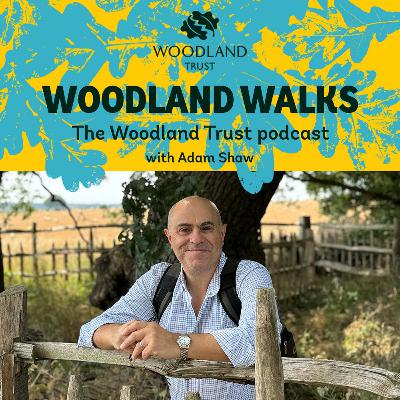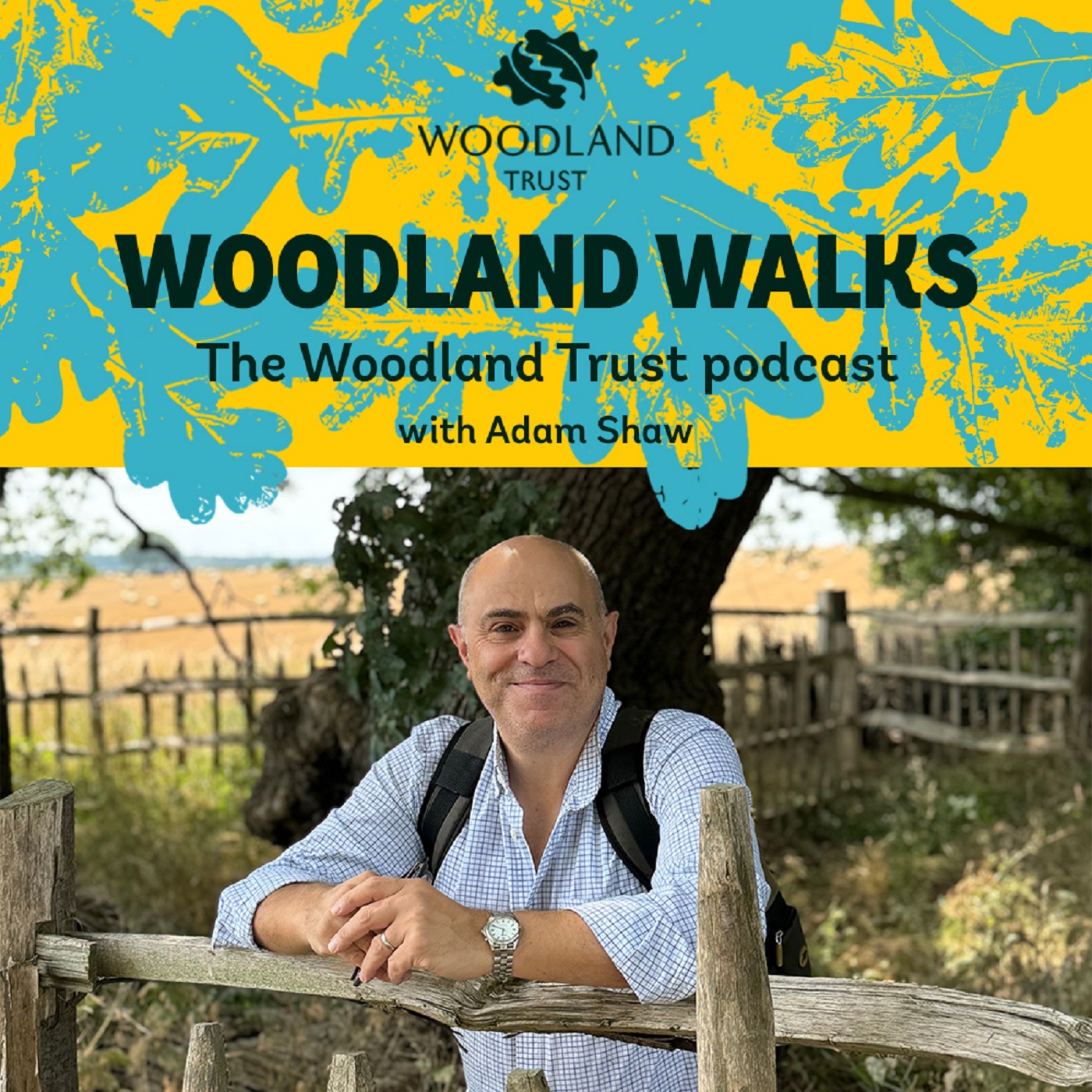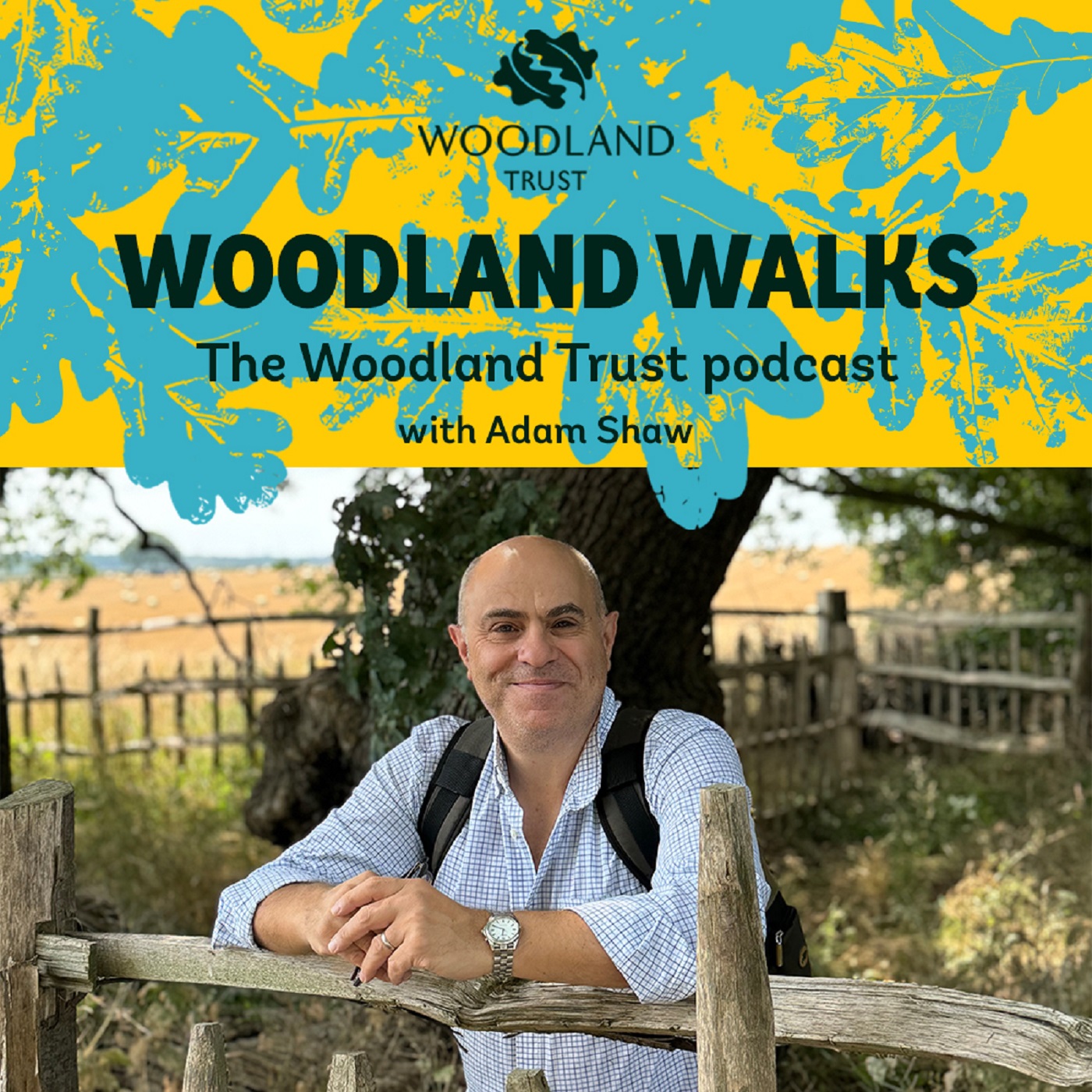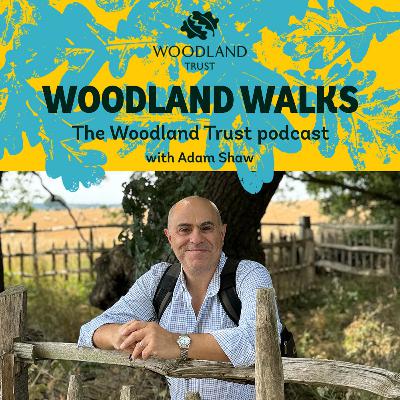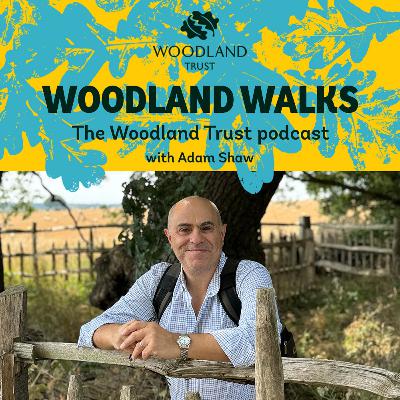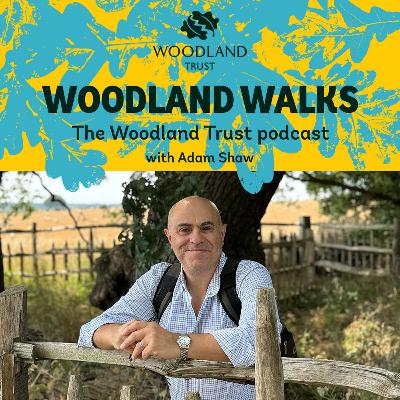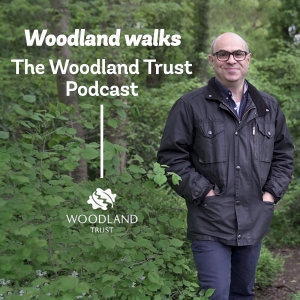2. Frodsham Woods, Cheshire: a new lease of life
Description
Join us for a jam-packed visit to Frodsham Woods, Cheshire, where 80 volunteers were planting thousands of trees to help transform a former golf course into a fantastic new space for wildlife and people. We visit the neighbouring ancient woodland and admire hilltop views with site manager Neil and chat to Tim, supervisor of this army of tree planters, about how the new wood will develop. We also meet Esther, lead designer of the project, hear from comms guru Paul about the Trust's #plantmoretrees climate campaign, and speak to the volunteers about what the day means to them.
Don't forget to rate us and subscribe! Learn more about the Woodland Trust at woodlandtrust.org.uk
Transcript
You are listening to Woodland Walks, a podcast for the Woodland Trust presented by Adam Shaw. We protect and plant trees for people to enjoy, to fight climate change and to help wildlife thrive.
Adam: Well, today's podcast is a bit of an unusual one because I'm off to an abandoned golf course in Cheshire, overlooking Liverpool. Not far away, in fact. And the vision is to create this once golf course into a thriving mosaic of habitats, including lush broadleaved woodland, grassland meadows and wooded glades dotted with wildflowers. Throughout the site, they're creating a network of grassy paths so people can walk through them and get far-reaching views of the Welsh borders, the western Pennines and the Bowland Fells, along with, of course, Liverpool and the Mersey Estuary. And very excitingly, the man actually who's running all the tree planting there is also in a band, and it's his music and his band's music you can hear in the background. More about that a little later. It's called Frodsham Woods, and it's near the Frodsham train station. Guess where? In Frodsham. Well, today we are starting, I'm starting sitting down with Neil Oxley, who's the site manager here. Hi Neil.
Neil: Good morning, Adam.
Adam: Good morning. So, just explain where we are because we are, well, I'm not gonna take away your thunder. Explain. It's an unusual location.
Neil: So, we’re sat on a bench overlooking the River Mersey and Liverpool. We're on the old golf course that was closed about three years ago.
Adam: Yeah, well that's what I think is unusual – sitting on a golf course. I gotta take, it doesn't look like a golf course. They, the greenkeeper would have had a heart attack seeing the state of this place. But what's amazing is, well, I'm looking over a forest of planted trees. I mean, just within 10 yards, probably a couple of hundred of them, just been planted. So, this has got to be unusual. Take buying a golf course, turning it into a forest?
Neil: It is, yeah. I think it's probably the first golf course that the Woodland Trust has taken on and it's just a great opportunity, though, that when it became available, it's adjoining some of our existing woodlands, including ancient woodland. And it's given us an opportunity to plant lots of trees and work with local people and engage the community in doing something good for the climate.
Adam: And we're sitting down, looking over what might be, I don't know. Is that a bunker? Do you think that’s a bunker?
Neil: It is, yep. So, there there's probably about 40 bunkers on the golf course and we've kept them all, so some of those old features are still here.
Adam: And I saw one, some gorse growing, just naturally growing in the bunker there.
Neil: There is. Just in the two or three years since it stopped being maintained. There's gorse, there's silver birch, there's all sorts of trees and plants that are now appearing.
Adam: I love the gorse. It's bright. It comes out early. Bright yellow. Real splash of colour in early spring. It's really.
Neil: It is, yeah, it's lovely and colourful.
Adam: And we're looking over a range of wind turbines. And is that the Mersey ahead?
Neil: That is, that's the River Mersey.
Adam: Although there’s not much river, it looks, it looks like it’s out. It's mainly mud.
Neil: It’s probably low tide at the moment. Yeah, and Liverpool just beyond the other side.
Adam: Very nice. So, you're going to be my main guide today. We've got lots of people to meet, I know. Alright. Brilliant. So, explain to me the plan for the day.
Neil: So, we're gonna have a walk round and look at some of the tree planting that we've already done here. We've got some groups of corporate volunteers and Woodland Trust staff here today also who are planting trees. So, we'll go and see them later on. But I thought maybe to start off with we could go and visit some of the ancient woodland that borders the site and show you sort of why it's important that we're doing what we're doing today.
Adam: Brilliant. I'm of an age where sitting down is quite nice, but that's not going to get, that's not gonna get nothing made, is it? It's alright. We better get up and you lead on.
Neil: OK, let's go. This lady, by the way, coming with the pug. She's up here all the time. She's really lovely, friendly, always talks to me and Paul. And we've already said hello to her, but he...
Adam: Oh, this dog wants a lot of attention.
Neil: He loves that. He loves that, yeah.
Adam: We'll let the rest of the team pet the dog. You know, you've paused here for a special reason. Why?
Neil: Yeah. So, this area, we're on the edge of the ancient woodland now and the part of the site in front of us is going to be left for what's called natural regeneration to develop. So, that will be where trees can self-seed and set and grow naturally. So, we're not actually planting any trees in this area in front of us. And you can see there's some silver birch trees there that probably self-seeded five or 10 years ago on the edge of the golf course. And they're growing quite well already.
Adam: So, and what's the advantage of that? There's a big debate about rewilding and all of that. So, why has that become an important issue?
Neil: It is, I mean to different people it can mean slightly different things as well. But basically it's leaving the land to develop and rewild itself, you know, for nature to colonise it. It's a slower process.
Adam: So, because if you're planting them yourself, you're planting all the trees at the same time. They're all the same age, so they get wiped out. Everything gets wiped out.
Neil: Potentially yes. You could lose a lot more.
Adam: Actually, I'm surprised those are natural regeneration because they've, it's very regimented. Those silver birch, they've all come up in exactly the same space, very close together. It looks like there's been some thought behind that.
Neil: It does. It does and again nature can do things very similar to how people plant trees. You know, you often can end up with them very densely packed, more densely packed than we're planting them, actually.
Adam: Yeah, OK. Well, we're still surrounded by these young, young trees. So, you lead on. Where are we heading off to?
Neil: So, we're just walking into, towards the ancient woodland area. So, this this is called Woodhouse Hill and it's mostly oak and some silver birch, some holly growing in here, plus a few other species as well.
Adam: And wonderfully of you, you've taken me to the muddiest bit of land there is. Are we going through this?
Neil: This, well, we can do. It's unfortunately because of the winter we've had, some of the paths are very wet and muddy around here now.
Adam: So, I have my walking boots on. You squelch ahead and I’ll squelch behind you.
Neil: OK. We'll carry on then.
Adam: So, we're heading up, give us a better view of the Mersey, a better view of Liverpool.
Neil: That's right. Just around the corner, there's a really good viewpoint where the view will open up and a sunny day like today get quite good views.
Adam: And is it used by the locals a lot? I mean, it's relatively new then. I mean, presumably a lot of locals don't know about it.
Neil: Well, I mean since, the golf course was closed down during the pandemic, and at the time the owner allowed the public to come and walk on the site. So, suddenly from people being not allowed to use it unless they were playing golf, local people were allowed to come and walk the dogs or just walk themselves around with the family. So, people did get to know the site and start using it, but it also borders some existing woodlands with footpaths, which is where we are now. So, these existing woodlands were already well-used.
Adam: Right. And what's the reaction of the locals been to the development here?
Neil: Very positive. Yeah. I mean obviously there's always a fear when a piece of land is up for sale that it might go for some sort of development, housing or be sold to a private landowner who fences it off and stops people using it. So, people have been, yeah, really positive, really supportive. The consultation that we did before we started anything was all very much in favour of creating woodland and allowing public access.
Adam: I think we're coming up to a viewpoint here where there's a bench.
Neil: There is, we should have another sit down.
Adam: And it's very steep here. You wouldn't want to be falling off that, but this is a beautiful view.
Neil: Yeah. The weather today is just great for the view.
Adam: We've been blessed. Look at this. And then you look across a sort of flat valley floor with some wind turbines, which some don’t like but I always think they're really majestic. And beyond the wind turbines, the Mersey, where the tide is out. And beyond that, that's Liverpool. And is that Liverpool Cathedral? The grey building in

